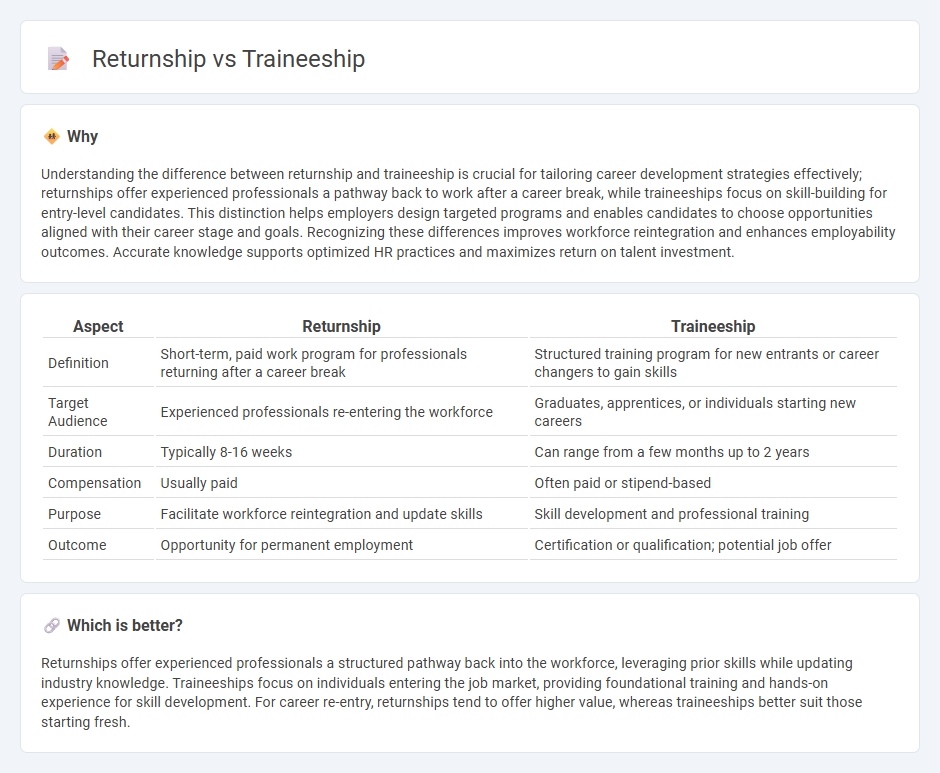
Returnship programs offer experienced professionals a structured pathway to re-enter the workforce, focusing on updating skills and easing the transition after a career break. Traineeships target individuals new to a field, providing on-the-job training combined with formal education to build foundational competencies. Explore the differences between returnships and traineeships to determine which option best suits your career goals.
Why it is important
Understanding the difference between returnship and traineeship is crucial for tailoring career development strategies effectively; returnships offer experienced professionals a pathway back to work after a career break, while traineeships focus on skill-building for entry-level candidates. This distinction helps employers design targeted programs and enables candidates to choose opportunities aligned with their career stage and goals. Recognizing these differences improves workforce reintegration and enhances employability outcomes. Accurate knowledge supports optimized HR practices and maximizes return on talent investment.
Comparison Table
| Aspect | Returnship | Traineeship |
|---|---|---|
| Definition | Short-term, paid work program for professionals returning after a career break | Structured training program for new entrants or career changers to gain skills |
| Target Audience | Experienced professionals re-entering the workforce | Graduates, apprentices, or individuals starting new careers |
| Duration | Typically 8-16 weeks | Can range from a few months up to 2 years |
| Compensation | Usually paid | Often paid or stipend-based |
| Purpose | Facilitate workforce reintegration and update skills | Skill development and professional training |
| Outcome | Opportunity for permanent employment | Certification or qualification; potential job offer |
Which is better?
Returnships offer experienced professionals a structured pathway back into the workforce, leveraging prior skills while updating industry knowledge. Traineeships focus on individuals entering the job market, providing foundational training and hands-on experience for skill development. For career re-entry, returnships tend to offer higher value, whereas traineeships better suit those starting fresh.
Connection
Returnship and traineeship programs both serve as structured pathways for individuals to re-enter or start their careers by gaining hands-on experience and building relevant skills in a professional setting. Returnships specifically target experienced professionals who have paused their careers, offering tailored opportunities to refresh their competencies and adapt to current industry standards. Traineeships provide entry-level candidates with foundational training and practical exposure that prepare them for full-time employment in their chosen fields.
Key Terms
Skill Development
Traineeships and returnships both prioritize skill development but serve different target groups; traineeships typically support individuals entering the workforce with foundational training, while returnships help experienced professionals re-enter their careers after a hiatus. Traineeships emphasize structured learning and hands-on experience to build entry-level competencies, whereas returnships concentrate on updating existing skills and adapting to industry changes. Explore how each program can uniquely boost your professional growth and career advancement.
Career Re-entry
Traineeships provide structured training programs primarily for recent graduates aiming to gain practical experience and develop skills in a new field. Returnships target professionals re-entering the workforce after career breaks, offering tailored support to update skills and rebuild confidence. Explore how these opportunities can accelerate your career re-entry and match your professional goals.
Mentorship
Traineeships offer structured mentorship programs designed to develop foundational skills for entry-level professionals, whereas returnships provide tailored mentorship to support individuals re-entering the workforce after a career break. Both models emphasize guidance, but returnships often prioritize confidence-building and updating industry knowledge specific to career re-entry challenges. Explore the unique mentorship benefits of traineeships and returnships to determine the best fit for your career development.
Source and External Links
Trainee - A trainee is an employee undergoing a training program within a company, combining theory and practice, often with a salary and potential for permanent employment after the program ends.
Stage USA - J1 Trainee Placements - The J-1 Traineeship program offers recent graduates an opportunity to gain professional experience in the U.S., typically lasting 12 to 18 months, with compensation and visa arrangements included.
About the traineeship - European Commission - The European Commission offers Administrative and Translation traineeships, focusing on tasks such as attending meetings, drafting documents, and supporting public inquiries across various policy fields in EU institutions.
 dowidth.com
dowidth.com